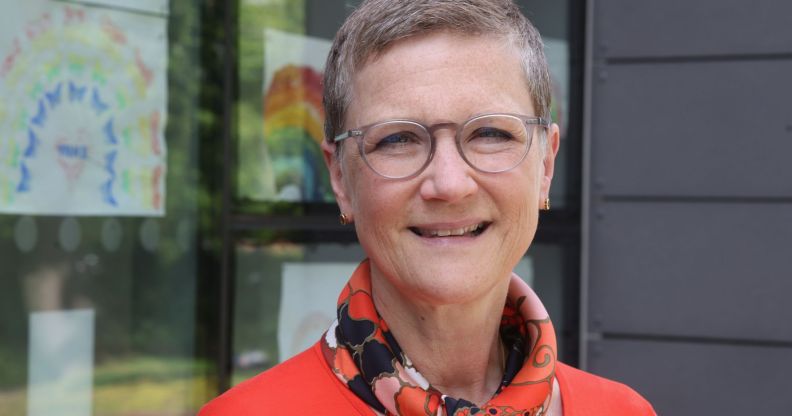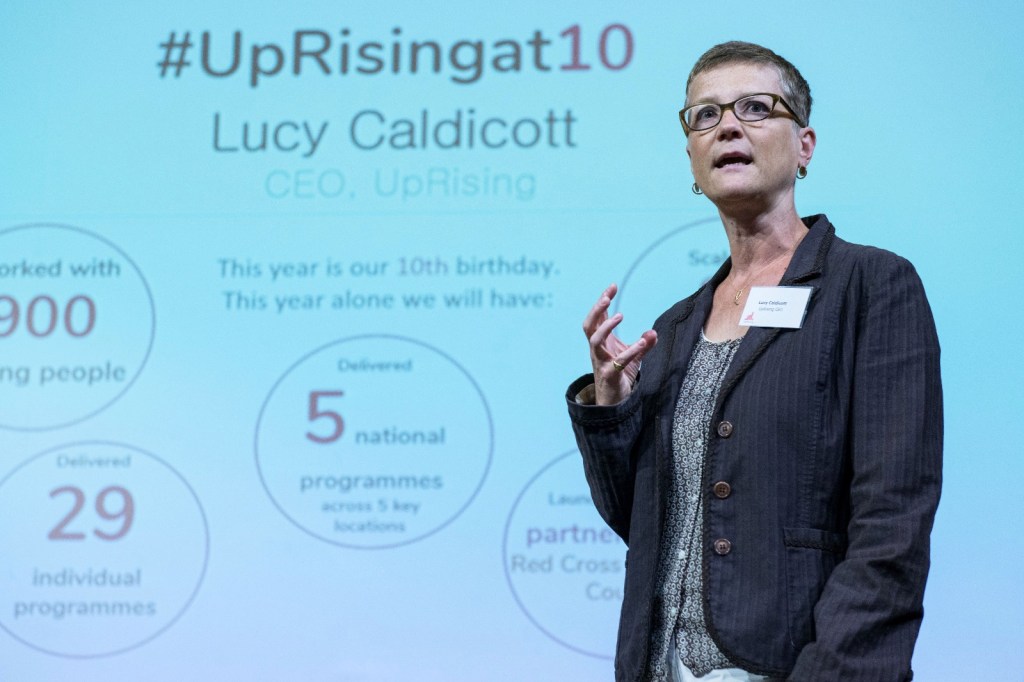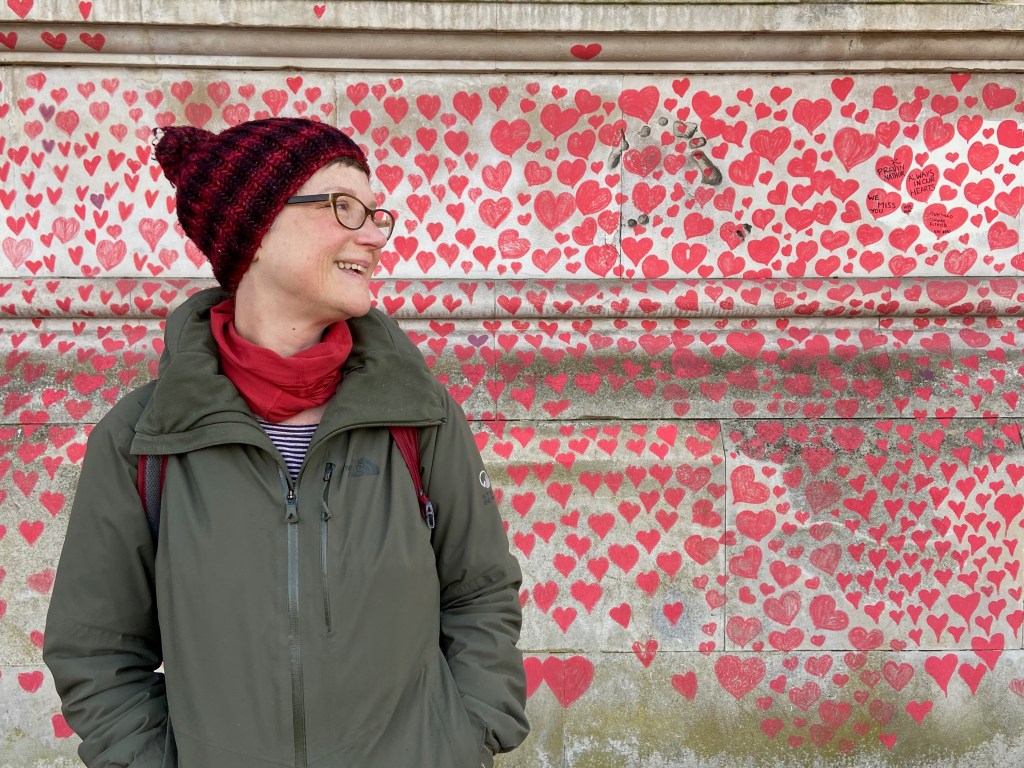ChangeOut CEO Lucy Caldicott says charity sector can have a ‘blind spot’ when it comes to diversity

Lucy Caldicott is the founder of ChangeOut, a social consultancy dedicated to seeing change in the third sector. (Lucy Caldicott)
To celebrate Lesbian Visibility Week, PinkNews speaks to Lucy Caldicott, CEO of the third-sector consultancy ChangeOut, about diversity and inclusion and the need for more lesbian women in senior leadership roles.
Despite efforts to promote diversity and inclusion (D&I) within the workplace, the C-suites are still predominantly made up of straight white men. A recent report revealed that despite a respectable representation in senior management roles, less than 10 per cent of C-suite roles are occupied by lesbian women. When it comes to the top job, just three per cent of CEOs are lesbian women or non-binary individuals.
Surprisingly, one area of business that’s no stranger to the straight white guy boardroom is the third sector. Also known as non-profits, non-governmental organisations (NGOs), charities or social enterprises, these organisations serve social actions like supporting cancer patients or refugee awareness. They are not privately owned, nor funded solely by the government.
One woman on a mission to help diversify these boardrooms and bring inclusion to the charitable sector is Lucy Caldicott. As the founder of the social consultancy ChangeOut, she is dedicated to advancing inclusion in the charity and advocacy leadership landscape.
Speaking to PinkNews over a Zoom call from her home in the Midlands, Caldicott acknowledges that the lack of D&I in charity organisations can be surprising to some. “Often in the charity sector, we assume we’re the good guys because we’re doing good things,” she says, “so that can be a bit of a blind spot. We kind of don’t really face up to when we’re getting things wrong, because we’re the good people, aren’t we?”

“A distance between what I saw at the top and the world I navigated”
Lucy Caldicott, CEO of ChangeOut
After starting her career in financial services, Caldicott shifted to charity work. During morning commutes in London to charity offices she noticed the disconnect between the people leading the charities and those who benefit from them. It was then she was inspired to start up ChangeOut.
“I always observed that there was often quite a distance between what I saw at the top of the organisations I work for and the world navigated around,” she notes.
“As you get more senior in charities, it gets even more kind of monocultural,” she continues, “it’s quite a female-dominated sector, but as you get more senior, it becomes more male. And there’s often a distance between the people with personal experience of the issues that the charity sets out to address like homelessness or poverty.”
When it comes to D&I, Caldicott believes that many businesses and organisations are looking for a quick fix that will bring instant change rather than taking a deeper look into the issues. “This isn’t just about training,” says Caldicott. “There’s no harm in doing training but that’s not going to solve the issues – what you need to do is look at your organisation and really understand what the issues are for your organisation.”
Caldicott – who was also a Labour Parliamentary candidate in Dudley South – believes that for the third sector to be truly inclusive, stakeholders need to have conversations about why D&I is important and to understand the difference between equity and equality. Once those questions are answered internally, organisations can then make the connection between their individual purpose and wider inclusion efforts.

“It’s not an overnight thing”
Lucy Caldicott, CEO of ChangeOut
Addressing the lack of lesbian women in leadership roles in the C-suite and in the boardrooms, Caldicott believes that there are a few things that can be done, but concedes that the road to total inclusion is a long journey.
The first step is to identify the problem by collecting data on who organisations are attracting, hiring and promoting. She thinks that a key component of talent progression means that equality is always addressed.
“That requires kind of long-term systemic systematic work,” she admits. “Again, it’s not an overnight thing.”
Another reason for the lack of lesbian visibility in top roles is that many women are afraid to be out. Part of this could be due to how loaded the word “lesbian” has become over the years. “The term is interpreted by different people in different ways,” she says. “One of the things that hold people back from coming out is the negativity around that word.”
Caldicott credits the anxiety that many confront around identifying themselves as a lesbian due to the small minority of lesbians that are anti-trans. “Most of us are supportive of trans people and trans rights, and that’s the message that we need to kind of get out there – a positive message.”
For the younger generation of lesbian women looking to further their careers, Lucy thinks it’s important to seek out employers who are supportive of the entire LGBTQ+ community. “You have a choice,” she says. “When you’re going into the world of work, it’s as much about you finding the place that’s good for you as them hiring you. It is a two-way thing.”
Above all else, Lucy believes that authenticity is key.
“Try to be yourself as much as you can,” she concludes. “Know that you are loved and that you are valued. And if your employer isn’t showing you that, don’t put up with it.”

